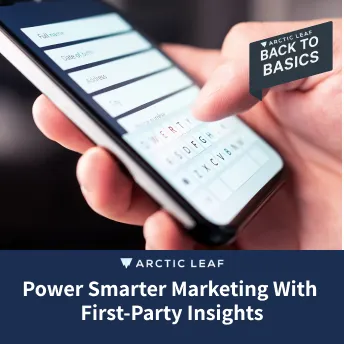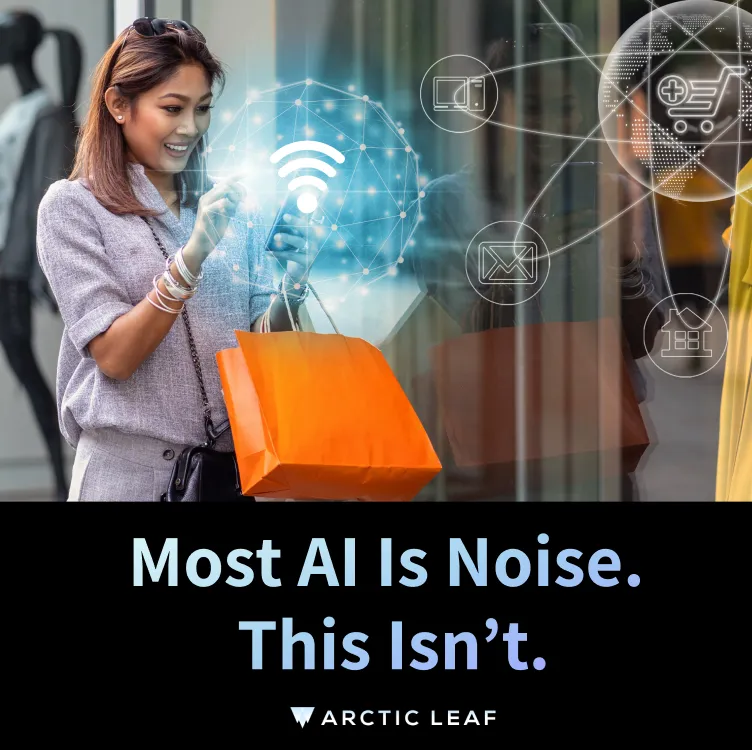AI vs Specialist by Numbers
Key Takeaways:
-
Consumers instantly recognize AI-generated marketing and trust it significantly less than human-created content.
-
AI cannot replace the strategic thinking, creativity, and relationship-building that drive successful marketing campaigns.
-
The hybrid approach of AI handling execution while specialists provide strategy delivers work 10x faster without sacrificing quality.
-
As AI-generated content floods the internet, future AI models train on degraded data, making human expertise increasingly valuable.
-
AI makes basic tactics cheap, but human strategy and authentic brand voice become premium differentiators.
Why AI-Only Marketing Feels Soulless
(And What to Do Instead)
"I've been swamped with mediocre AI messages. There are vaguely customized (but now totally recognizable) cold emails, and now text-to-speech voices are leaving me messages asking to set meetings. If you run one of these automated-AI lead funnel businesses, you guys have already burned your bridges after the category only existing for less than a year. Stop the slop. It's hurting us all."
That frustrated Reddit post from a small business owner captures what thousands of marketers and consumers are experiencing right now: AI fatigue. The promise of AI marketing was revolutionary efficiency. The reality? Generic, soulless content that people spot instantly and trust even less.
But here's the thing: the debate shouldn't be AI versus humans. The real question is AI marketing done alone versus AI marketing with specialists. One approach burns bridges. The other builds better marketing faster.
The "AI Slop" Problem: Why Everyone Can Spot It
Let's start with the uncomfortable truth: people notice AI-generated marketing immediately.
"It's so obvious when companies spam you with AI," one Redditor noted. "It's a way to show them that you don't care about quality or the human touch. If you don't care enough for a human being to pay attention to your business, I don't care enough to give you money."
The trust erosion is happening at breakneck speed. Multiple marketers in Reddit threads described how they can "really spot it" and how it all "sounds the same." LinkedIn posts with obvious AI fingerprints (too many emojis, markdown formatting that didn't render, that distinctive ChatGPT structure). Subject lines that are "super generic and obviously AI sounding." Voice messages that "all sound almost exactly the same from different hustlers."
The patterns are appearing across platforms, from cold emails to social media posts to automated phone calls. When every business uses the same AI tools, their outreach starts blending together into a wall of sameness that audiences have learned to ignore.
One CTO described it perfectly: "AI-generated marketing copy always reads like a sleazy second-hand car salesman wrote it even with the best models."
The data backs this up. Research comparing AI versus human copy found that human-generated content outperformed AI in cost-effectiveness in 9 out of 12 scenarios. Another study from NP Digital showed that human-generated content received 5.44 times more traffic than AI-generated content.
The rise of generative AI tools has made content creation faster, but it's also created a customer experience problem: audiences can immediately tell when they're being marketed to by machines rather than humans.
For agencies offering copywriting, social media management, and email design services: This is your moment. Clients need specialists who can create content that doesn't sound like "everyone else using the exact same tools." The bar for standing out has actually gotten higher, not lower, especially on social media, where audiences scroll past obvious AI content in seconds.
What AI Actually Can't Do (No Matter What LinkedIn Says)
"Stop reading LinkedIn," one marketing veteran advised. "And definitely stop doing what people on LinkedIn are telling you to do. LinkedIn is almost entirely grifters who're full of s*** and trying to sell you something."
Harsh, but fair. Reality check: marketers are identifying massive gaps that AI simply cannot fill.
Strategic Thinking Dies Without Human Insight
"If you don't have strategy, AI just helps you screw up faster." This comment got hundreds of upvotes because it's brutally accurate. AI executes tasks. It doesn't decide which tasks are worth executing.
As one experienced marketer explained: "Think of AI potentially replacing the 'doer' tasks, and us mere marketing humans powering the strategy and deep market knowledge. AI is a supplementary tool, where it can carry out simple, but time consuming parts of your role, but that leaves you time for the nitty gritty, such as customer research, focus groups, ABM, marketing tech, and operations."
The professionals who understand this balance (using AI for efficiency while maintaining strategic control over marketing efforts and campaigns) are the ones seeing real results.
Creativity and Brand Voice Require Human Touch
"AI will never be able to smell the bakery, process the feel of a fresh, warm loaf coming out of the oven, or recall the cherished childhood memory of a loved one pulling the cookies out of the oven."
That poetic observation points to a fundamental limitation: AI lacks lived experience. It can't understand "the bakery owner who wants his shop full on Sundays, or the customers who buy because of smell, story, or nostalgia."
AI can't truly understand what drives potential customers to choose one brand over another when the decision is rooted in emotion, memory, or cultural context rather than pure logic.
Multiple Redditors emphasized that "AI lacks the creativity and nuance that humans bring to the table" and "can't understand human audience psychology."
The craft of persuasive writing, whether for copy, content, or creative campaigns, still demands human insight into what truly moves people to action.
Relationships and Trust Are Fundamentally Human
"The main thing AI cannot do is build human connections."
This showed up repeatedly in discussions. "People still hire humans for strategy, creativity, and relationships." One marketer noted: "You still need people behind it who actually get your audience and can validate what's working."
Building genuine customer relationships and driving meaningful customer engagement requires the human ability to listen, empathize, and adapt in real-time.
Quality Control Becomes Critical
Here's an uncomfortable truth: "It gets numbers wrong all the time. Literally worse at math than me."
Another marketer described AI as "like hiring a third grader into an insights team" because "those idiot LLMs hallucinate and source garbage so often."
Without human oversight, AI produces confidently wrong information.
The Hidden Costs of AI-Only Marketing
Beyond the obvious quality issues, marketers report deeper problems with AI-only approaches.
The Editing Burden
"If I rely solely on AI, then I have to be more actively involved in that process as every bit will have to be scrutinized and then edited."
One marketer shared their reality: with proper AI supervision, they can produce content in 30 minutes instead of 3 hours. But without that supervision? "The output is s***."
The Sameness Problem
"If everyone starts creating their own campaigns with AI, the result will be a ton of campaigns that are all the same."
The mathematics are simple. When thousands of businesses and companies use the same tools with similar prompts, they get similar outputs. "If you're relying on AI to generate your copy completely from the ground up with zero training, you're in trouble because you're going to have copy that sounds like everyone else using the exact same tools."
This is where human collaboration becomes critical. Specialists bring industry knowledge, brand personality, and audience understanding that prevents your marketing from blending into the AI-generated noise. They know when to break patterns, when to take creative risks, and how to inject the distinctive voice that makes people actually pay attention. They also understand emerging market trends that AI models (trained on historical data) simply can't anticipate. Companies that combine human expertise with AI capabilities see measurable growth, while those relying on AI alone struggle with declining engagement. Without that human layer, you're just another business producing content that looks and sounds like everyone else's.
Skill Erosion
"People get complacent, lack the basic skills in marketing and don't know how to critique and scrutinize AI's outputs. The standard of work will just keep dropping over time."
The Long-Term Death Spiral
"AI will have to scrape from AI; in short, it'll get worse as it'll eat itself. It's almost like recycling plastic, every time we do it, the quality of the plastic gets worse."
This is the ouroboros problem internet theorists call the "Dead Internet Theory." When AI pulls content from the web, learns patterns from that content, and generates new content based on those patterns, it creates a feedback loop. If everyone publishes AI-generated marketing, future AI models train on that synthetic content. The result? AI learning from AI, which learned from AI. The creative diversity and human insight that made the original training data valuable gets diluted with each generation.
As more AI-generated content floods platforms and the internet, future generative AI models train on increasingly degraded data. The marketers who "stop expecting AI to solve their problems and actually get their hands dirty will be the ones whose copy converts and whose images captivate their audiences."
The Hybrid Advantage: How AI + Specialists Actually Works
So what does good implementation look like?
"AI is a tool, not a replacement. Those who understand how to leverage AI will have a competitive advantage."
The key to success is understanding the clear division of labor between what AI handles and what requires human expertise.
What AI Should Handle
The boring parts like sorting leads, drafting emails, and spotting patterns in customer data. Small repetitive tasks where it functions like a beginner virtual assistant. Speed and scale: creating content drafts, automating reports, finding information faster. Research, outlines, keyword analysis, data processing, initial customer insights, and basic audience segmentation.
What Humans Must Own
Strategy and Direction: AI shouldn't be doing the thinking. It needs someone to provide ideas, context, and direction. Whether you're generating images, planning a marketing campaign, or developing a marketing strategy, the human sets the vision.
Brand Voice and Creativity: Train AI on your existing materials and guide it with your target audience, but use its output as inspiration, not the final product. Real personalization requires understanding context and nuance that goes far beyond inserting a first name into an email template. Adapting to customers preferences and creating messaging that resonates requires human intuition. This applies to everything from visual design prompts to messaging frameworks.
Quality Control: Fact-checking is non-negotiable. AI confidently generates incorrect information, creates images with anatomical impossibilities, and misses cultural context. You need specialists who can spot when something is wrong, not just when it looks wrong.
Experience and Judgment: The human element matters most in decisions that require lived experience. Understanding why a campaign failed, when to pivot strategy, how to handle a PR crisis, or what appeals to a specific community. Interpreting customer behavior requires the kind of pattern recognition that comes from years of work, not training data. Every strategic decision benefits from human context that AI simply cannot replicate.
Client Relationships: Use AI as a tool for efficiency, but make decisions based on context and connect with clients in ways AI can't. Relationships are built on trust, empathy, and understanding that comes from real conversations.
How This Works in Practice
Multiple marketers independently described the same workflow: AI handles the initial heavy lifting like research, data processing, and first-pass execution. Humans review, fact-check, and remove the obvious AI artifacts. Then they add creativity, strategic thinking, and the refinements that require judgment. The result? Work that takes 30 minutes instead of 3 hours while maintaining quality.
This hybrid approach is transforming how marketing teams operate. Instead of replacing human expertise, generative AI amplifies it by handling repetitive tasks while specialists focus on strategy and creative decisions that require human judgment.
"The best results usually come from AI + human marketer. AI handles the repetitive, data-heavy, scalable stuff, while humans focus on strategy, creativity, and connection."
Real Talk: What Actually Works
For businesses evaluating marketing partners, here are the green and red flags:
Red flags:
-
Agencies pushing "full AI operations"
-
Promises of instant results with minimal human involvement
Green flags:
-
Clear explanation of how AI and human expertise work together
-
Specialists who understand your industry and audience
-
Transparent recommendations based on your specific business context
Questions to ask potential partners: "How do you balance AI efficiency with human expertise?" and "What parts of the process require human oversight?"
The Bottom Line
"AI won't make marketing obsolete, but it will make marketers who don't use AI obsolete."
True. But the inverse is equally important: AI-only approaches are already failing in the market. The marketers thriving right now aren't the ones building AI tools or replacing their teams with automation. They're the ones using AI to deliver better results while charging premium prices for their expertise.
"AI makes tactics cheap. Strategy becomes more valuable than ever."
The future isn't about choosing between AI and specialists. Smart marketing combines both: AI handles speed and scale while specialists bring strategy, creativity, and trust. Together, you get faster delivery without sacrificing quality or authenticity.
As we head into 2026, we're tracking how the hybrid approach impacts conversion rates, customer trust metrics, and ROI. While everyone's debating whether AI will replace marketers, we're proving that AI plus specialist expertise is what actually drives results.





